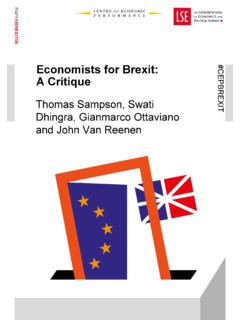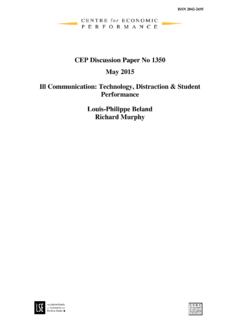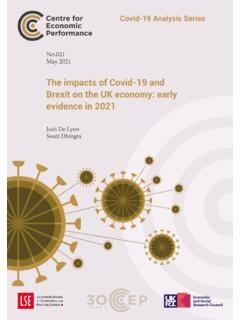Transcription of The impact of Brexit on foreign investment in the UK
1 The impact of Brexit on foreign investment in the UKSwati Dhingra, Gianmarco Ottaviano, Thomas Sampson andJohn Van Reenen#CEPBREXITPAPERBREXIT03 CEP Brexit ANALYSIS No. 3 The impact of Brexit on foreign investment in the UK foreign direct investment (FDI) raises national productivity and therefore output and wages. Multinational firms bring in better technological and managerial know-how, which directly raises output in their operations. FDI also stimulates domestic firms to improve for example, through stronger supply chains and tougher competition. The UK has an FDI stock of over 1 trillion, about half of which is from other members of the European Union (EU).
2 Part of the UK s attractiveness for foreign investors is that it brings easy access to the EU s Single Market. After Brexit , higher trade costs with the EU would be likely to depress FDI. Our new empirical analysis looks at bilateral FDI flows between 34 OECD countries (including the UK) over the last three decades. Controlling for many other factors, the baseline estimate is that EU membership has raised FDI by about 28%. The positive effect of EU membership on FDI is robust, ranging between 14% and 38% under different statistical assumptions. The size of these effects is also consistent with comparisons between UK FDI flows and a set of matched control countries.
3 Striking a comprehensive trade deal for example, joining Switzerland in the European Free Trade Association would not significantly reduce the negative effects of Brexit on FDI, according to the data. Assessing the impact of lower FDI on income is complex. We use existing macroeconomic estimates of how FDI affects growth combined with a very conservative estimate of the impact of Brexit a 22% fall in FDI over the next decade. We calculate that a Brexit -induced fall in FDI could cause a decline in real income about 2,200 of GDP per household.
4 The income losses due to lower FDI are larger than our estimates of static losses due to lower trade of to Estimates of the impact of Brexit on the UK s car industry imply that UK production would fall by 181,000 cars (12%) and prices would rise by Even if the UK manages a comprehensive trade deal and keeps tariffs at zero, production would fall by 36,000 cars. The UK s financial services industry is the largest recipient of FDI. Restrictions on single passport privileges following Brexit , would lead to big cuts in activity. Furthermore, the UK would be unable to challenge EU regulations at the European Court of Justice.
5 Centre for Economic Performance London School of Economics and Political Science Houghton Street, London WC2A 2AE, UK Tel: +44 (0)20 7955 7673 Email: Web: Disclaimer:The Centre for Economic Performance (CEP) is a politically independent Research Centre at the London School of Economics. The CEP has no institutional views, only those of its individual researchers. Professor John Van Reenen who joined the CEP as Director in 2003, did not (and does not) support joining the s Brexit work is funded by the UK Economic and Social Research Council. As a whole the CEP, receives less than 5% of its funding from the European Union.
6 The EU funding is from the European Research Council for academic projects and not for general funding or Introduction foreign direct investment (FDI) comprises investments from outside a country to start up new subsidiaries, to expand existing establishments or to acquire local companies. The UK is a major recipient of FDI with an estimated stock value of over 1 trillion, about half of which is from other members of the European Union (EU), according to UK Trade and investment (UKTI, 2015). Only the United states and China receive more FDI than the UK.
7 Countries generally welcome FDI as it tends to raise productivity, which increases output and wages. FDI brings direct benefits as foreign firms are typically more productive and pay higher wages than domestic firms. But FDI also brings indirect benefits as the new technological and managerial know-how in foreign firms can be adopted by domestic firms, often through multinationals supply chain (Harrison and Rodriguez-Clare, 2009). FDI can also increase competitive pressure, which forces managers to improve their performance. There are at least three reasons why FDI might fall if the UK left the EU: First, being fully in the Single Market makes the UK an attractive export platform for multinationals as they do not bear potentially large costs from tariff and non-tariff barriers when exporting to the rest of the EU.
8 Second, multinationals have complex supply chains and many co-ordination costs between their headquarters and local branches. These would become more difficult to manage if the UK left the EU. For example, component parts would be subject to different regulations and costs; and intra-firm staff transfers would become more difficult with tougher migration controls. Third, uncertainty over the shape of the future trade arrangements between the UK and the EU would also tend to dampen FDI. This report analyses what could happen to UK FDI inflows after Brexit and what effect these FDI changes could have on income levels in the UK.
9 The effect of EU membership on FDI A number of factors determine where firms choose to locate and invest. Bigger and richer markets tend to attract more firms, which want to be close to their customers. The UK has strong rule of law, flexible labour markets and a highly educated workforce, all of which make it an attractive FDI location whether or not it is in the EU. But since EU membership reduces trade and investment costs, it is likely to have an impact even after controlling for these other factors. To estimate the size of the effect of being in the EU on FDI, we provide a new empirical analysis see Bruno et al (2016) in the Technical Appendix to this report.
10 It is a statistical model based on the bilateral FDI flows between 34 OECD countries from 1985 to 2013. The model estimates why foreign investors choose to invest in the UK, as opposed to other countries such as Germany, France or the United states . It is similar to the gravity model that is the standard way of estimating bilateral flows of exports and imports. 3 Bilateral FDI flows between any pair of countries depend on their respective market size (measured by GDP), the geographical distance between them and other factors such as GDP per capita. The model addresses the question of how much more FDI would flow between two countries if the sender or the recipient joins the EU, once all these factors are taken into account.







